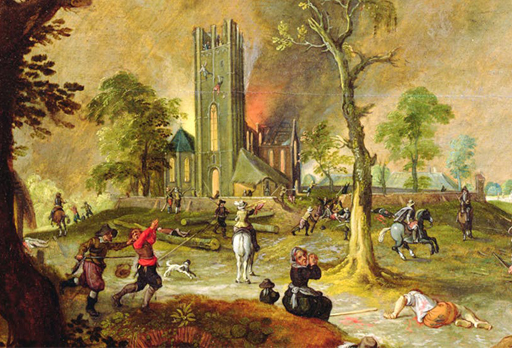1.2 War and certainty
In Cosmopolis: The Hidden Agenda of Modernity (Toulmin, 1990), the philosopher Stephen Toulmin (1922–2009) argues that the work of Leibniz and Descartes shares a deeper common source. This was the 30-years war, a brutal war that ravaged much of Europe between 1618 and 1648 (Figure 4). Descartes experienced the consequences of the war in person, whereas Leibniz was born in its final two years and did his work during its aftermath.

In the war, theological disputes between Catholic and Protestant people were settled by force rather than reason and discussion. Descartes and Leibniz sought a method for yielding conclusions that were beyond doubt, in any dispute. Such a source of certainty would make it unnecessary to resort to violence. Any dispute could be settled by applying the method. During his life, Leibniz was actively involved in diplomacy and theological discussions aimed at bringing the sides together.
Interestingly, the work by Llull, another of Leibniz’s inspirations, was also powered by the desire to settle theological disputes, although from a partisan angle. The story goes that Llull, born in Majorca, converted to Christianity between 1263 and 1265, abandoned family life and dedicated the rest of his life to converting Muslim and Jewish people. For instance, in 1293 he travelled to Tunis, seeking discussions with the city’s intellectuals. This visit came to an end when he was imprisoned and subsequently expelled. However, the experience did not stop him from further similar undertakings, resulting in more prison visits, on occasion with Muslim scholars frequenting his cell in attempts to convert Llull.
To aid him in these disputes, Llull had developed a paper machine of rotating discs marked with philosophical and theological axioms. It was said that any question about Christianity could be answered by appropriate manipulation of this machine.
